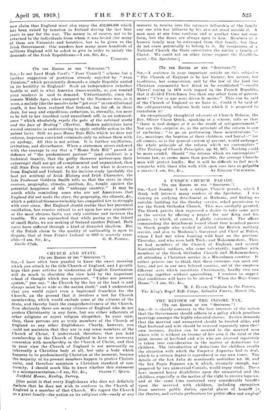[To THE EDITOR or THE "SPECTATOR.") Sin,Is not Lord Hugh
Cecil's "Four Council" scheme but a further suggestion of partition already rejected by " Sinn Feinism," which persistently demands a single Republic united in its hostility to England? Such an independence (whether hostile or not) is. what America (inaccurately, as you remind your readers) is said to demand. Unfortunately, since the remote Middle Ages, when conquest by the Normans was, as it were, a malady like the measles to be "got over" in constitutional youth, it has been realized that Ireland, too far off, in those slays, for easy and expeditious reduction, is, eternally, too near to be left to her troubled (and unrealized) self, to an independ- ence "which absolutely repels the yoke of the external world and the face of Destiny" (Martin). Modern politicians have wasted centuries in endeavouring to apply suitable action to the patent facto. Still we pass Home Rule Bills whirls we dare not enforce, imprison convicted criminals only to release them with an apology. All this is not action. It is further vacillation, irritation, and disturbance. When a statesman arises endowed with the courage to any that a "Home Rule Bill" passed in defiance of "the predominant partner" (and creditor) is a technical inanity, that the guilty (however picturesque their entourage) shall not get off complimented and unpunished, then will Sinn Fein receive not what it asks but what it deserves from England and Ireland. In his incisive study (probably the best yet written) of Irish History and Irish Character, the late Professor Goldwin Smith tells us that the stars in their courses, geography, climate, position, &c., fought against the potential happiness of the " unhappy country." It may be worth while reminding somo who are not Americans that England did not make the stars, the geography, the climate, de., which a political Siamese-twinship has compelled her to struggle with ever since. But England should realize that her perennial vacillation, her evasive refusal to act upon her own arguments or the most obvious facts, can only continue and increase the trouble. We are reproached that while posing as the friend of small States we are making of Ireland another Poland. Both races have suffered through a kind of distorted idealism. But if the Polish claim to the quality of nationality is open to dispute, that of Sinn Feinist Ireland in 1919 is scarcely argu-






































 Previous page
Previous page